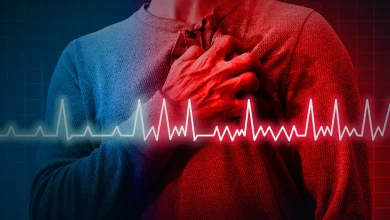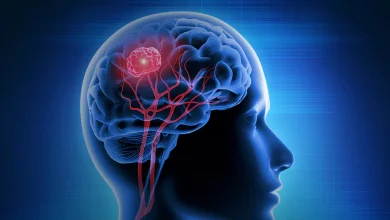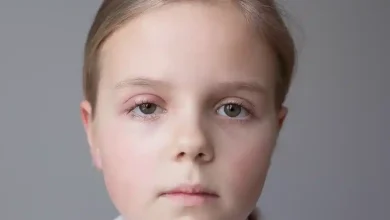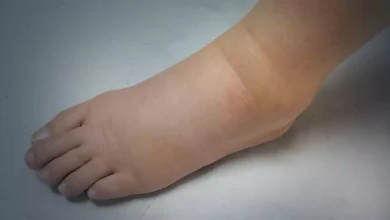What are Cold Sores?
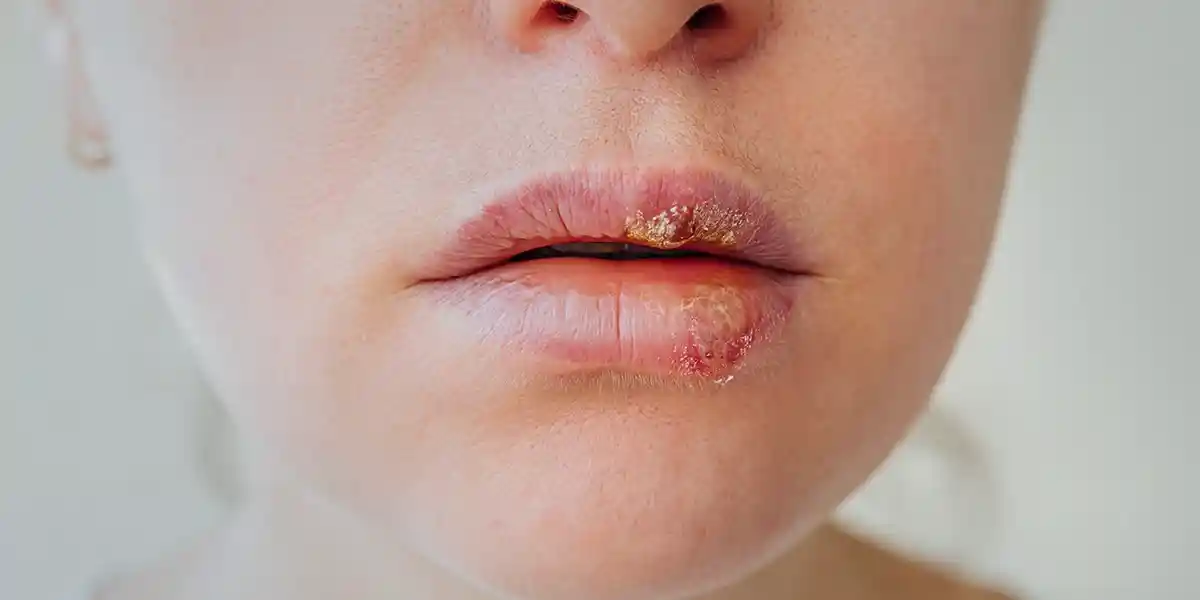
Cold sores also known as fever blisters, is a viral infection that is quite common. Cold sores are small, fluid-filled blisters that appear on and near the lips. These blisters are usually clustered together in patches. Scab forms if the blisters are broken that can last for many days. While cold sores generally appear on your lip or around your mouth, they can also appear on your cheeks, chin, and nose. It is contagious and spreads from person to person through close contact, like kissing. Generally, herpes simplex virus type 1 (HSV-1) causes them, and herpes simplex virus type 2 (HSV-2) also causes them but less commonly. The mouth or genitals can be affected by both of these viruses and can be spread by oral sex. The virus can spread even if sores are not visible. Cold sores generally heal in 2 to 3 weeks of their own without leaving any scar.
What are the Types of Cold Sores?
Cold sores are caused by two types of viruses: HSV-1 and HSV-2:
- Herpes simplex virus type 1 (HSV-1)
- Herpes simplex virus type 2 (HSV-2).
- Cold sores around the mouth also called ‘oral herpes’ are usually caused by HSV-1 and most cases of genital herpes are caused by HSV-2.
- Cold sores on the mouth may result in genital infection during oral sex for people who are not already carrying the cold sore virus (HSV-1).
What are the Symptoms of Cold Sores?
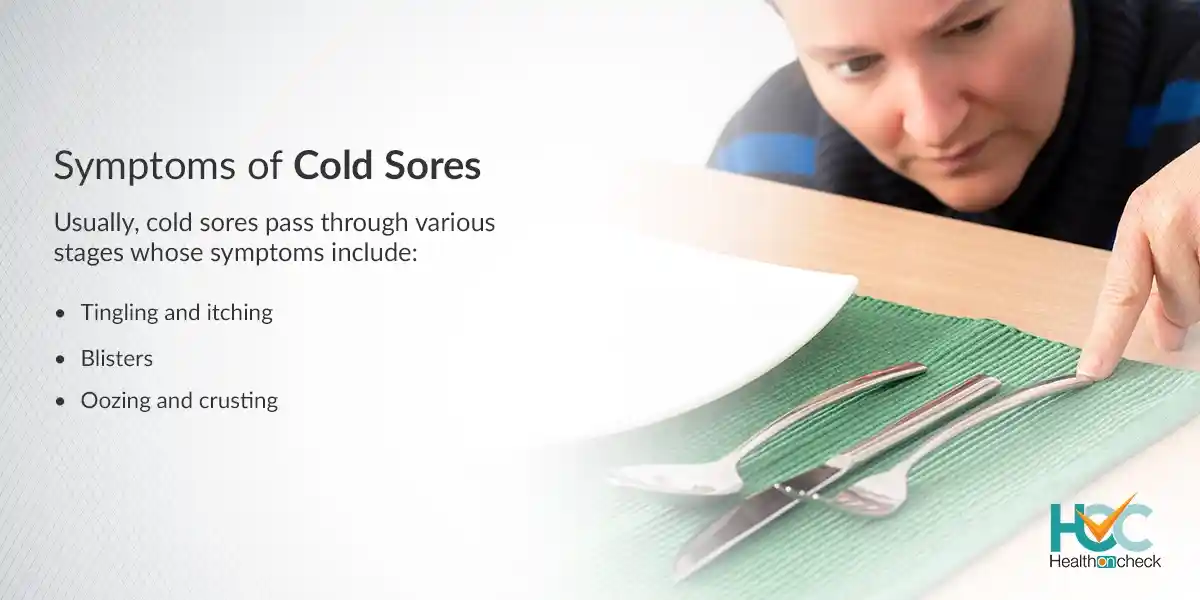
Usually, cold sores pass through various stages whose symptoms include:
Tingling and itching: Many people experience tingling, itching, or burning near their lips, and then a tiny, hard, painful spot appears and blisters start to form.
Blisters: Then tiny fluid-filled blisters form around the border of the lips. A few times they form around the nose or cheeks or inside the mouth.
Oozing and crusting: The small blisters might integrate which then burst leaving shallow open sores that ooze and crust over.
The symptoms of cold sores vary, based on whether it is your first outbreak or a reappearance. If it’s for first time that you are having cold sores, symptoms might not begin till 20 days after you got exposed to the virus for the first time. The sores can last for many days and it can take 2 to 3 weeks for the blisters to heal completely. If blisters recur, they usually appear at the same spot each time and are generally less severe than the first outbreak.
In a first-time outbreak, you might have symptoms including:
- Fever.
- Painful gums.
- Sore throat.
- Headache.
- Muscle pain.
- Swollen lymph nodes.
Children below the age of 5 might have cold sores inside their mouths which are often mistaken for canker sores. Only the mucous membrane is involved in canker sores and herpes simplex virus does not cause it.
What are the Causes of Cold Sores?
Some specific strains of the herpes simplex virus (HSV) cause cold sores. HSV-1 usually causes cold sores and HSV-2 usually causes genital herpes. But both of these viruses can spread to the face or genitals via close contact, including kissing or oral sex. HSV-1 can also be spread through sharing utensils, toothbrushes, razors, and towels.
When you have oozing blisters, the chances of cold sores being spread increase but the virus can be spread even if you don’t have blisters. Many times people with the virus that causes cold sores never show symptoms but can spread the virus to others.
If you had a herpes infection before, the virus might hide in nerve cells in your skin and can lead to another cold sore at the same place as earlier. A recurrence of cold sores might occur due to:
- Fever or viral infection.
- Hormonal changes, like those linked to a menstrual period.
- Stress.
- Fatigue.
- Getting exposed to the sun or wind.
- Immune system changes.
- Skin injury.
What are the Risk Factors of Cold Sores?
Anyone can get cold sores and many adults carry the virus responsible for cold sores, even if they don’t show any symptoms.
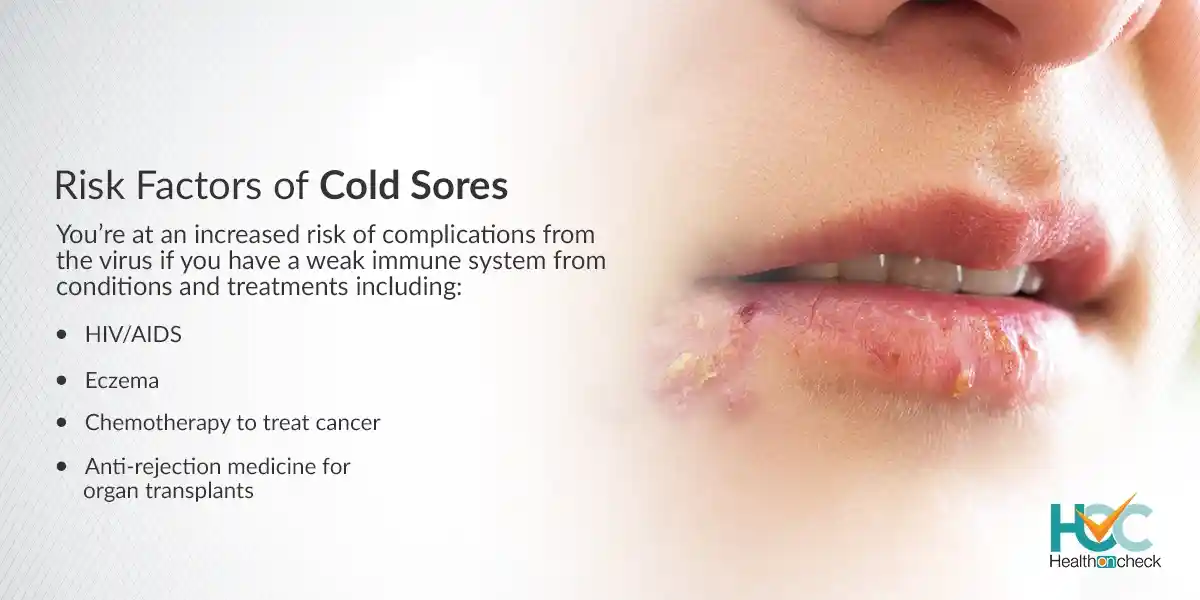
You’re at an increased risk of complications from the virus if you have a weak immune system from conditions and treatments including:
- HIV/AIDS.
- Eczema.
- Chemotherapy to treat cancer.
- Anti-rejection medicine for organ transplants.
What are the Complications of Cold Sores?
In a few people, the virus that causes cold sores can also cause complications in other parts of the body, including:
Fingertips: Both HSV-1 and HSV-2 viruses can spread to the fingers and cause an infection known as herpes whitlow. Children who have a habit of sucking their thumbs might spread the infection from their mouths to their thumbs.
Eyes: Sometimes the virus can cause infection in the eyes and if the infections keep repeating it can result in scarring and injury, which might cause vision problems or even vision loss.
Widespread areas of skin: People having a skin condition known as atopic dermatitis (eczema) are at increased risk of cold sores spreading all over their bodies which can become a medical emergency.
How Cold Sores are Diagnosed?
A professional doctor can diagnose cold sores just by looking at them. Your doctor may take a sample from the blister and send it to a laboratory to confirm the diagnosis.
What are the Treatment Options Available for Cold Sores?
Cold sores often get cured on their own without treatment in 2 to 5 weeks. In some cases, your doctor may refer antiviral medicine to fasten the healing process including:
- Acyclovir.
- Valacyclovir.
- Famciclovir.
- Penciclovir.
Some of these medicines are in the form of pills which you have to take orally and others are lotions and creams which you have to apply on the sores several times a day. Usually, the pills are more effective than the creams. For very serious infections, antiviral medicines are injected sometimes.
Living with Cold Sores
People who develop cold sores usually learn to live with and manage their outbreaks. Cold sores generally clear up rapidly with no lasting effects. However, for some people, especially those with weak immune systems, cold sores can lead to life-threatening infections. Infants, people with eczema, and compromised immune systems should see a doctor as soon as possible if the symptoms of cold sores appear.
Whom to Consult?
Cold sores usually clear up without treatment. But you should seek medical assistance if you have a weak immune system, cold sores are not healing even after two weeks, symptoms are severe and keep returning, or you experience painful and gritty eyes.

